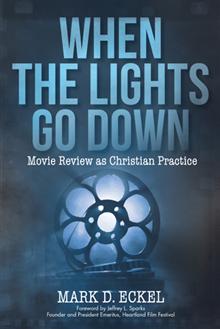

If the Christian story is true, it is true for all people, places, cultures, and times.
Reflection
She started the conversation. “I couldn’t help but notice you’re working on a presentation about movies.”
There is not much you can hide, sitting next to others on a plane. “That’s right. I am teaching a series on movies at my church.”
She was surprised but honest. “That’s odd. A church doing a series on movies?” She paused, smiled, and then asked, “So, what’s your favorite movie?”[i]
It is inevitable. It’s the same question every time. Why? Because most people watch movies. And most people have favorite movies. Stories may draw us together, but movies make us sit down together.
People are drawn together, because we all have something in common. Theologians call it “common grace.” Here is my definition of common grace: the goodness of all creation benefits all people. The Scripture’s emphasis is on God’s beneficence and goodness, as seen in weather, language, discovery, agriculture, you name it.[ii]
Movies can be a great demonstration of common grace. Christians hold universal ideals with all theatergoers. As a Christian, I maintain that:
- common grace allows
- common truth to establish
- common law for the
- common man, finding
- common ground with all.

Francis Schaeffer said that “true truth” exists.[iii] Francis Schaeffer maintained that since people espoused so many truths, “true truth” was a necessary distinctive for Christian thought. I consistently find true truth with the movie-going public. I waited in line for an hour to enter a theater; something I have not done before or since. The Dark Knight drew me, a handful of college students, and hundreds of others to the Cineplex that evening.
“Welcome to a world without rules” served as the tagline for Dark Knight. In the midst of a war on terror, Christopher Nolan ponders the great issue of our day: can principled individuals or nations retain their standards when combating an enemy who has none? How does one battle a person who has no ethics and whose goal in life is anarchy? The Joker has no compulsion for a “fair fight.” He’s pleased for the thrill of the kill with a combatant of Batman’s stature.
Joker revels in the joy of carnage. There is no concern about “collateral damage.” Anxiety about anything is absent. Alfred well summarizes the situation:
Some men aren’t looking for anything logical, like money. They can’t be bought, bullied, reasoned, or negotiated with. Some men just want to watch the world burn.
As an issue of common grace, I share the angst of addressing an enemy without ethics. Common grace forces me to recognize that other people are asking the same questions.
As I walked out of the movie theater that night, I understood something else: common grace also takes the form of common response. September 11, 2001, marked a common day of mourning. September 12, 2001, marked a common day of resolve. The Dark Knight is but one example of the many movie truths held by both believer and unbeliever alike.
What do Christians have in common with all theatergoers? Since pieces of truth exist in film because of God’s goodness within creation, the Christian recognizes cinematic merit in movie stories, while acknowledging existing error. My common grace movie examples take into account movies that are family-friendly, older, newer, harsh, tearful, funny, and sad and movies about which good folk will agree to disagree.[iv] Here are a few common grace categories and movie examples that face all people everywhere:
- Antibullying: Bully or Standing Up
- Education: Teach or The Emperor’s Club
- Redemption: Despicable Me or Seven Pounds
- Antiracism: The Help or Mississippi Burning
- Justice: 12 Angry Men or To Kill a Mockingbird
- Place: The River or Places in the Heart
- Life: Lost in Yonkers or Winter’s Bone
- Destiny: Forrest Gump or Simon Birch
Common forms of writing—treaties, stories, poems—were used by God when He spoke His Word into the Old Testament world. Common language—Koine Greek—was used by God when He spoke His Word into the New Testament. Common experiences of all humans dot the pages of Scripture. Common themes about life/death, joy/sorrow, justice/mercy, or peace/war are threads running through the Bible. Common questions everyone asks are given answer in God’s written revelation. If Christians want to communicate the common grace of God with everyone, the best place to begin is at the Cineplex.
When people go to the movies, they are attracted to stories they live, stories they know. Solomon connected with leaders in his day by writing the book of Ecclesiastes. Israel’s king declared “life is a gift of God” (Ecc 2:24-26; 3:14-15; 5:18-20), an evangelistic tract for the benefit of others (1 Kgs 9-10). Without a God-centered view, all of life’s good things (for example, place, justice, wisdom) are meaningless. The believer has a responsibility to live a life that attracts unbelievers (1 Thess 4:11-12; Titus 2:1-10; 1 Pet 2:11-12). Following the pattern set by Solomon, we connect “common” to “grace” through film.
Three hundred-plus people walked reverently from the theater after viewing The Dark Knight without saying a word. Not since Mel Gibson’s The Passion of the Christ had I encountered solemnity approaching worship in movie. I was so moved, it took me six months to write my own review of the film.[v]
I was moved by common grace coming through common truth to the common person facing a common law for the common good. God spoke this way to people through His Word. I should speak with people in the same way, through movies. Sometimes the discussion begins with a simple question: “What’s your favorite movie?”[vi]
Questions
- What does the movie say about life that can be celebrated or critiqued?
- How can common grace give opportunities for cultural engagement or evangelism?
- What is the difference between enjoying life as a Christian and enjoying life as an unbeliever? What would you say to someone who suggested Christianity is unnecessary?
- Does a Christian approach to common grace teaching eliminate the need for Christ?
- How do we make gospel connections to common grace?
Prayer
Dear Lord. Open my eyes that I may see wonderful things in Your law (Ps 119.18) so that I may know how to have conversations seasoned with salt as I communicate your truth in the culture (Col 4:5-6). Amen.
Resource

Mark D. Eckel. When the Lights Go Down: Movie Review as Christian Practice. (Westbow, 2014).
[i] Question asked and answered: Three Days of the Condor (Sidney Pollack, 1975).
[ii] Genesis 39:5; Psalms 107:8, 15, 21, 31, 43; 145:9, 15-16; Matthew 5:44-45; Luke 6:35-36; John 1:9; Acts 14:16-17; 1 Corinthians 7:12-14.
[iii] Francis A. Schaeffer, Escape from Reason (Downers Grove, IL: InterVarsity Press, 1971), 9-18.
[iv] On points of disagreement, see “Guidelines” section of When the Lights Go Down.
[v] “The Dark Knight,” warpandwoof.org/verbal-visual/ecklian-reviews-the-dark-knight/
[vi] Taken from the section “Common Grace” in Mark Eckel’s book When the Lights Go Down.
Editor’s note: The fourth piece in a five part movies series. If you’d enjoy the opportunity to write a review of a movie’s portrayal of higher education, interaction with an important topic with which you are familiar due to your studies/research, and/or value to your campus fellowship (due to a movie night, discussion group, etc.), please drop Thomas B. Grosh IV (Associate Director of the Emerging Scholars Network) a note. He’s very interested in hearing from you this summer 🙂
Dr. Mark Eckel is adjunct professor for various institutions, President of The Comenius Institute (website), spends time with Christian young people in public university (1 minute video), hosts a weekly radio program with diverse groups of guests (1 minute video), interprets culture from a Christian vantage point (1 minute video), teaches weekly at his church (video) and writes weekly at his website warpandwoof.org.

Leave a Reply